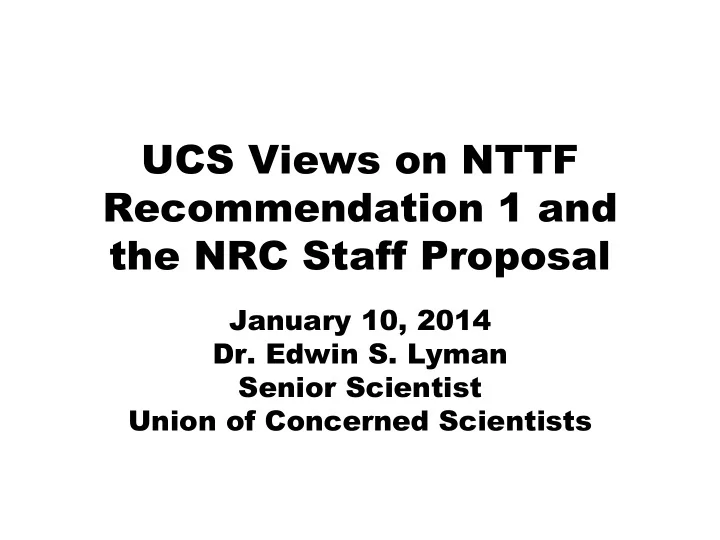

UCS Views on NTTF Recommendation 1 and the NRC Staff Proposal January 10, 2014 Dr. Edwin S. Lyman Senior Scientist Union of Concerned Scientists
UCS View UCS View on Severe Accidents on Severe Accidents • Vulnerability of the fleet to severe accidents remains unacceptably high • Flawed risk and regulatory analyses have been used to paper over these problems • The NRC has squandered multiple opportunities to address this problem over the decades – Post-TMI reforms – Severe Accident Policy Statement – IPE/IPEEE – License renewal • After Fukushima, will the NRC once again avoid doing what needs to be done to protect public health and safety? 2
NTT NTTF R F Recommendation ecommendation 1 • A comprehensive overhaul of the flawed regulatory patchwork highlighted by the NTTF is needed • UCS disagrees with the Staff’s rejection of the comprehensive reforms proposed in NTTF Recommendation 1 3
NTT NTTF R F Recommendation ecommendation 1 • Staff’s statement that maintaining the existing regulatory framework is a “viable and acceptable alternative” undermines the NTTF’s conclusion that “the NRC’s safety approach is incomplete without a strong program for dealing with the unexpected, including severe accidents” – Have resolutions of generic issues such as upstream dam failures been well-served by the current process? 4
osa l UCS Vie UCS View on Staff Prop w on Staff Proposa • UCS disagrees with many aspects of the Staff proposal • UCS supports a design-basis extension rule that would mandate retrospective, site-specific application of regulatory framework reforms – Otherwise the NRC will be merely “fighting the last war” • NRC should provide additional resources so that this activity does not detract from programs that address known safety and risk issues 5
A Revised Framework • Revised regulatory guidance should – Regulate severe accidents more tightly – e.g. at the 95 th percentile, not the mean – Increase geographical extent of accident consequences when appropriate – Consider qualitative aspects (e.g. land contamination) – Give more weight to defense-in-depth – Use risk analysis only when high-quality, full-scope PRAs are available and with appropriate consideration of uncertainty – Result in logical outcomes (e.g. mitigation equipment should be qualified to survive the event it is intended to mitigate) 6
A Retrospective, Comprehensive, Site-Specific Review • New IPE/IPEEE program – Consistent methodology across the fleet • New SAMA analyses using revised guidance – Every plant that has applied for license renewal already has a SAMA analysis – “Stress tests” to assess margins and identify cliff-edges – Required implementation of all all sa safety fety improvemen improve ments t ts tha hat th t the ne e new w an analysis alysis de determines to be termines to be ben beneficial eficial 7
Improvement Activity Improvement Activity #1 #1 • UCS disagrees with Staff that more comprehensive reform to fix the regulatory “patchwork” is not necessary given other post-Fukushima actions • Staff claims that “site -specific vulnerabilities related to seismic and flooding events are being addressed by the post- Fukushima actions” – but not in a manner consistent with Recommendation 1 8
Improvement Activity Improvement Activity #1 #1 • Current approach may only add more patches – From NRC staff presentation, Aug 22, 2013: • “Audits … revealed inconsistencies from site -to-site with respect to … evaluation of APM” and “consideration of potentially significant safety consequences” • December 23, 2013 RAI went out to over 80% of licensees – Points of contention between staff and licensees on mitigating strategies integrated plans include ‘identification of maintenance and testing programs for related equipment and procedures” • Placing “adequate protection” and “safety enhancement” requirements in the same “design - basis extension” category may only increase confusion 9
Improvement Activity Improvement Activity #2 #2 • The balance has shifted too far toward reliance on the results of faulty risk calculations without appropriate consideration of uncertainty • Regulatory analyses should systematically consider and give greater weight to defense-in-depth • UCS agrees with ACRS that Improvement Activities #1 and #2 are fundamentally linked and should not be considered separately • Would help make better decisions on issues including – Hydrogen control/mitigation – Filtered vents – Expedited spent fuel transfer – Emergency planning (e.g. expanded EPZs) – Security 10
Improvement Activity Improvement Activity #3 #3 • NRC should not credit voluntary industry initiatives to meet regulatory requirements – For protection against severe accidents in current framework – For protection against extended design-basis accidents in a revised framework • NRC needs full inspection and enforcement authority to ensure compliance measures are properly implemented and maintained • Situations like the so-called resolution of GI- 189 should never be allowed to happen again 11
Conclusions Conclusions • Although the staff’s proposals have merit, they address only certain pieces of the fundamental problem outlined by the NTTF and as such, likely will exacerbate the patchwork nature of NRC regulations • A more comprehensive approach is needed to adequately address severe accident risks post-Fukushima: Staff should have provided such an option to the Commission 12
Acronyms • APM: Available Physical Margin • EPZ: Emergency Planning Zone • GI: Generic Issue • IPE: Individual Plant Examination • IPEEE: Individual Plant Examination of External Events • NTTF: Near-Term Task Force • PRA: Probabilistic Risk Assessment 13
Acronyms • SAMA: Severe Accident Mitigation Alternatives • TMI: Three Mile Island • UCS: Union of Concerned Scientists 14
Recommend
More recommend